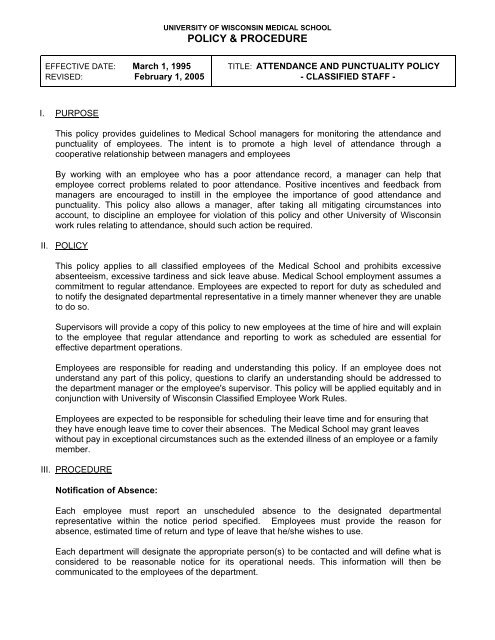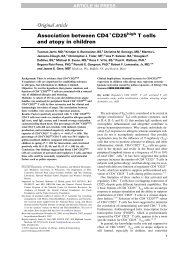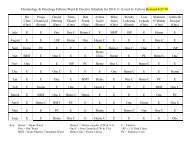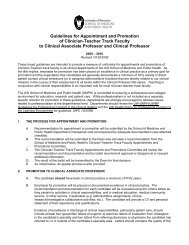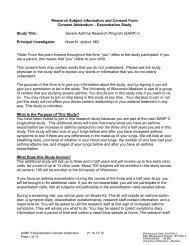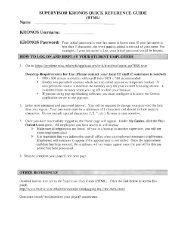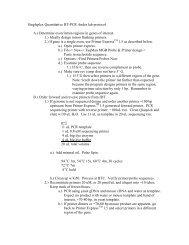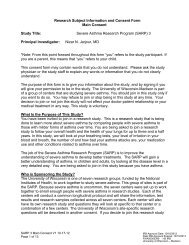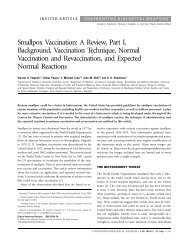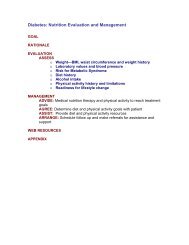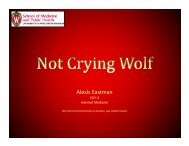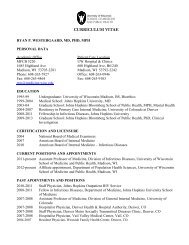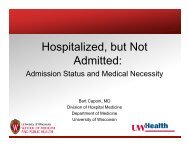Attendance & Punctuality Policy
Attendance & Punctuality Policy
Attendance & Punctuality Policy
You also want an ePaper? Increase the reach of your titles
YUMPU automatically turns print PDFs into web optimized ePapers that Google loves.
UNIVERSITY OF WISCONSIN MEDICAL SCHOOL<br />
POLICY & PROCEDURE<br />
EFFECTIVE DATE: March 1, 1995<br />
REVISED: February 1, 2005<br />
TITLE: ATTENDANCE AND PUNCTUALITY POLICY<br />
- CLASSIFIED STAFF -<br />
I. PURPOSE<br />
This policy provides guidelines to Medical School managers for monitoring the attendance and<br />
punctuality of employees. The intent is to promote a high level of attendance through a<br />
cooperative relationship between managers and employees<br />
By working with an employee who has a poor attendance record, a manager can help that<br />
employee correct problems related to poor attendance. Positive incentives and feedback from<br />
managers are encouraged to instill in the employee the importance of good attendance and<br />
punctuality. This policy also allows a manager, after taking all mitigating circumstances into<br />
account, to discipline an employee for violation of this policy and other University of Wisconsin<br />
work rules relating to attendance, should such action be required.<br />
II. POLICY<br />
This policy applies to all classified employees of the Medical School and prohibits excessive<br />
absenteeism, excessive tardiness and sick leave abuse. Medical School employment assumes a<br />
commitment to regular attendance. Employees are expected to report for duty as scheduled and<br />
to notify the designated departmental representative in a timely manner whenever they are unable<br />
to do so.<br />
Supervisors will provide a copy of this policy to new employees at the time of hire and will explain<br />
to the employee that regular attendance and reporting to work as scheduled are essential for<br />
effective department operations.<br />
Employees are responsible for reading and understanding this policy. If an employee does not<br />
understand any part of this policy, questions to clarify an understanding should be addressed to<br />
the department manager or the employee's supervisor. This policy will be applied equitably and in<br />
conjunction with University of Wisconsin Classified Employee Work Rules.<br />
Employees are expected to be responsible for scheduling their leave time and for ensuring that<br />
they have enough leave time to cover their absences. The Medical School may grant leaves<br />
without pay in exceptional circumstances such as the extended illness of an employee or a family<br />
member.<br />
III. PROCEDURE<br />
Notification of Absence:<br />
Each employee must report an unscheduled absence to the designated departmental<br />
representative within the notice period specified. Employees must provide the reason for<br />
absence, estimated time of return and type of leave that he/she wishes to use.<br />
Each department will designate the appropriate person(s) to be contacted and will define what is<br />
considered to be reasonable notice for its operational needs. This information will then be<br />
communicated to the employees of the department.
UNIVERSITY OF WISCONSIN MEDICAL SCHOOL<br />
POLICY & PROCEDURE<br />
EFFECTIVE DATE: March 1, 1995<br />
REVISED: February 1, 2005<br />
TITLE: ATTENDANCE AND PUNCTUALITY POLICY<br />
- CLASSIFIED STAFF -<br />
Failure to comply with notification standards may result in the scheduling of a pre-disciplinary<br />
meeting, which may result in discipline up to and including discharge.<br />
Reporting an absence does not guarantee that the absence will be automatically approved.<br />
Depending upon the nature of the reason for the absence, the supervisor may require additional<br />
verification before deciding if the absence is considered approved.<br />
Review:<br />
It will be the responsibility of each designated departmental representative or the appropriate<br />
supervisor to monitor the attendance record of each employee and to determine through a review<br />
process whether excessive absenteeism, excessive tardiness or sick leave abuse exists. A review<br />
of an employee's attendance or punctuality may be initiated if any of the following circumstances<br />
exist:<br />
A. three (3) unscheduled absences of any length in any 12 week period, including for reasons of<br />
illness or personal business,<br />
B. tardiness on three (3) occasions within a 12 week period. (Tardiness is defined as failing to<br />
report promptly, ready to work, at the scheduled starting time of the shift or taking<br />
unauthorized extended rest or meal periods.)<br />
C. a pattern of unscheduled absence in conjunction with:<br />
• scheduled days off,<br />
• legal holidays,<br />
• weekends,<br />
• same days of the week,<br />
D. any "0" sick leave balance,<br />
E. the use of unscheduled leave under false pretenses,<br />
F. unscheduled absences:<br />
• immediately following discipline,<br />
• after working a double shift,<br />
• after working overtime,<br />
• after having a leave request denied,<br />
• under any other suspicious circumstance as determined by a department manager,<br />
2- -
UNIVERSITY OF WISCONSIN MEDICAL SCHOOL<br />
POLICY & PROCEDURE<br />
EFFECTIVE DATE: March 1, 1995<br />
REVISED: February 1, 2005<br />
TITLE: ATTENDANCE AND PUNCTUALITY POLICY<br />
- CLASSIFIED STAFF -<br />
Absences approved under the Federal or State Family Medical (FMLA and WFMLA) laws may not<br />
be used as a basis for discipline.<br />
Absences due to job injury, funeral leave, vacation, holidays or other scheduled leave will not be<br />
included as a basis for discipline.<br />
Absences for which employees provide acceptable medical verification of their inability to work<br />
shall not be considered as unexcused absences. Note, however, that unexcused absences for<br />
which an employee brings in acceptable medical information may still be excessive and subject to<br />
possible discipline if the employee has no leave time to cover the absence and has exhausted<br />
FMLA and contractual leave without pay benefits.<br />
If a review of an employee's attendance is initiated, the manager must take into consideration any<br />
mitigating circumstances before determining that possible excessive absenteeism, excessive<br />
tardiness or sick leave abuse exists. Discipline is NOT to be automatically applied until the<br />
following procedure is followed.<br />
The manager should arrange for a pre-disciplinary meeting with the employee whose record is<br />
being reviewed. For represented employees a union representative may be present. The<br />
attendance or tardiness record is to be discussed with the employee in an attempt to determine if<br />
there is a mitigating reason for the poor record or possible abuse. The manager must be willing to<br />
work with the employee to resolve whatever circumstances are adversely affecting the attendance<br />
record.<br />
Progressive Discipline:<br />
Consultation with the Medical School Human Resources Office is required before disciplining an<br />
employee for violation of this policy or any other work rules relating to attendance.<br />
If, after the pre-disciplinary meeting, the manager determines that a violation of workrule exists<br />
and that discipline is appropriate, progressive discipline is to be applied. Typical progressive<br />
discipline includes the following steps:<br />
• 1st violation - written reprimand<br />
• 2nd violation - one day suspension without pay<br />
• 3rd violation - three day suspension without pay<br />
• 4th violation - five day suspension without pay<br />
• 5th violation - termination<br />
These progressive steps will be taken in the order listed in all cases except where the manager<br />
determines that a violation is serious enough to warrant a higher level of discipline. Examples of<br />
serious violations include: no-call/no-show or leaving work without authorization. No-call/no-show<br />
for five consecutive days or more will result in the scheduling of a pre-disciplinary meeting and<br />
may result in discharge without prior discipline.<br />
3- -


